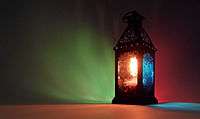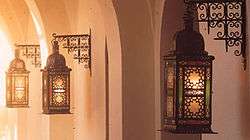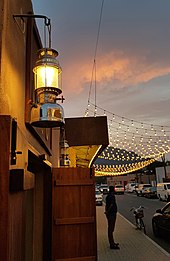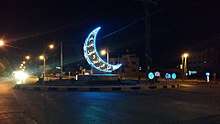Fanous
Fanous (Egyptian Arabic: فانوس IPA: [fæˈnuːs], pl. فوانيس [fæwæˈniːs]), meaning lamp or light, is widely associated with Fanous Ramadan or Fanoos Ramdan.(Arabic: فانوس رمضان)[1] is a folk and traditional Egyptian lantern.
Etymology
The word "Fanous" (Fanos, Phanous and Fanoos in Egyptian dialects) is a term of Greek origin transliterated to "candle". It means 'light' or 'lantern'. It was historically used in its meaning of "the light of the world," and is a symbol of hope, as in "light in the darkness".
History

The traditional use of fanous as decorations associated with Ramadan is believed to have originated during the Fatimid Caliphate, primarily centered in Egypt, where tradition holds that the Caliph Al-Muizz Lideenillah was greeted by the Egyptian people holding lanterns to celebrate his arrival at Cairo during the holy month of Ramadan. Its use has now spread to almost all Muslim countries.[2]


In Ancient times it was similar to a lamp, and would have incorporated either candles or oil. The fanous originally developed from the torches used in the Pharaonic festivals celebrating the rising of the star Sirius. For five days, the Ancient Egyptians celebrated the birthdays of Osiris, Horus, Isis, Seth and Nephtys—one on each day—by lighting the streets with the fanous (torches).[1] Torches or candles were also used in early Christianity. This is recorded by Egyptian historian Al-Maqrizi (1364 - 1442), who noted in his book, "Al Mawaiz wa al-'i'tibar bi dhikr al-khitat wa al-'athar", that these torches or candles were used at Christmastime for celebration.
Today
Fanous is widely used all over the world – especially in Asian regions and the Arab world – not just for a specific religion purposes, but for names of people or decorative purposes. They can be found in houses, restaurants, hotels, malls, etc. Often arranged as a grouping of lights arranged in different designs and shapes. Metal and glass are mostly used for their construction.
References
- Fanous Archived 2009-08-28 at the Wayback Machine; 2009 article; Al-Ahram Weekly Online
- "فانوس رمضان.. قصة بدأت فى "المحروسة".. استقبل به المصريون الخليفة المعز لدين الله الفاطمى.. وارتبط بالشهر الكريم.. واشتهرت صناعته من النحاس المنقوش وصولا للنسخ المقلدة والصناعة الصينى". Youm7.
